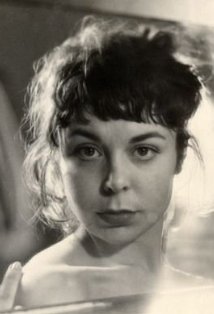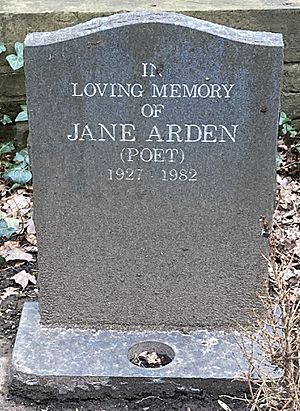Jane Arden (director) facts for kids
Quick facts for kids
Jane Arden
|
|
|---|---|
 |
|
| Born |
Norah Patricia Morris
29 October 1927 Pontypool, Monmouthshire, Wales
|
| Died | 20 December 1982 (aged 55) |
| Resting place | Highgate Cemetery (west side) |
| Alma mater | Royal Academy of Dramatic Art |
| Occupation | Actress, film director, playwright, poet, screenwriter and songwriter |
| Spouse(s) | Philip Saville |
| Children | 2 |
Jane Arden (born Norah Patricia Morris; 29 October 1927 – 20 December 1982) was a talented British artist. She was a film director, actress, singer, songwriter, and poet. Jane Arden became well known in the 1950s for her creative work.
She was born in Pontypool, Wales, and later studied acting at the Royal Academy of Dramatic Art in London. She started acting in the late 1940s. In the 1950s, she began writing plays and scripts for television. In the 1960s, she became involved in movements that supported women's rights (called feminism) and new ideas about mental health (called anti-psychiatry).
Jane Arden wrote the script for the film Separation (1967). In the late 1960s and 1970s, she created experimental theatre shows. She even turned one of her plays into a film she directed herself, called The Other Side of the Underneath (1972). In 1978, she published a book of poetry. Jane Arden passed away in 1982. Her important films were later restored and released for people to watch.
Contents
Early Life and Acting Career
Jane Arden was born Norah Patricia Morris in Pontypool, Wales. She loved acting and studied at the Royal Academy of Dramatic Art in London. After her studies, she started her career in the late 1940s. She appeared in television shows and films.
One of her early roles was in a TV version of Romeo and Juliet. She also starred in two British crime films: Black Memory (1947) and A Gunman Has Escaped (1948). These films were later released on DVD for people to enjoy.
Writing for Stage and Screen
In the 1950s, Jane Arden married Philip Saville, who was a film director. They lived in New York for a short time, where Jane started writing. Later, they moved to Hampstead, England, and had two sons. Jane then wrote many plays and television scripts. Her husband, Philip, even directed some of them.
Jane Arden worked with important people in British theatre and cinema. Her play Conscience and Desire, and Dear Liz (1954) got a lot of attention. She also co-wrote a funny TV show called Curtains For Harry (1955). This show was one of the first to be shown on the new ITV network.
In 1958, her play The Party was performed in London. It was a family drama. A famous actor named Charles Laughton directed it. It was also the first time a young actor named Albert Finney appeared on the London stage. Jane's TV drama The Thug (1959) gave Alan Bates an important early acting role. In 1964, Jane Arden acted alongside Harold Pinter in a TV show called In Camera.
Exploring New Ideas in Film and Theatre
Jane Arden's work became more daring as she got involved in new ideas. She supported feminism, which is about equal rights for women. She also joined the anti-psychiatry movement, which looked at new ways to understand mental health. These ideas strongly influenced her work from 1965 onwards.
Her TV drama The Logic Game (1965) showed her new approach. She wrote and starred in it. She also wrote the script for the film Separation (1967), which was filmed in black and white. The music for this film was by the band Procol Harum.
Before Separation, Jane Arden worked on a documentary film called Dalí in New York (1966). In this film, she walked around New York City with the famous artist Salvador Dalí and talked about his art. This film was later shown at a special art exhibition.
In the mid-1960s, Jane Arden also appeared in other TV shows, including Exit 19 and The Interior Decorator. She also appeared in the funny news show That Was the Week That Was. In the late 1960s and 1970s, she returned to cinema as an actor, writer, and director. She also created experimental theatre shows, which were very different from traditional plays.
In 1970, Jane Arden started a theatre group called Holocaust. She wrote a play for them called A New Communion for Freaks, Prophets and Witches. This play was later made into her film The Other Side of the Underneath (1972). She directed the film and also appeared in it. When the film was shown at festivals, it caused a lot of discussion. It showed a woman's journey through a difficult time with her mental health.
Throughout her life, Jane Arden was very interested in different cultures and beliefs. She was always on a personal journey to understand more about spirituality.
After The Other Side of the Underneath, Jane Arden worked with Jack Bond on two more films. These were Vibration (1974), which used experimental film techniques, and the futuristic film Anti-Clock (1979). Anti-Clock featured songs written by Jane and starred her son, Sebastian Saville. This film opened the 1979 London Film Festival.
In 1978, Jane Arden published a book called You Don't Know What You Want, Do You?. She gave public readings and discussions to support her book. Even though it was called poetry, it was also a strong statement about society and psychology. By this time, Jane believed that all people needed to be free from too much focus on just logic and reason.
Personal Life
Jane Arden had two sons with her husband, Philip Saville: Sebastian and Dominic.
In the last years of her life, Jane Arden struggled with sadness. She passed away in Coverdale, Yorkshire, on 20 December 1982. Her death deeply affected Jack Bond, who had worked with her on many films. He decided to keep their films in a film archive for several years before releasing them.
Legacy and Influence
In 2008, Jane Arden's work was discussed at a conference about British culture in the 1970s.
In 2009, the British Film Institute restored three of Jane Arden's most important films: Separation (1967), The Other Side of the Underneath (1972), and Anti-Clock (1979). These films were then made available on DVD and Blu-ray. Jack Bond helped with the restoration. There was also an exhibition of the restored films. While her films are available, her books of poetry and plays are currently out of print.
As a way to honor Jane Arden, an experimental-music group called Hwyl Nofio included a song called "Anti-Clock" on their album Dark (2012). The band's leader, Steve Parry, is also from Pontypool, Jane Arden's hometown.
Selected Works
- 1947 Romeo and Juliet (BBC Television, actor)
- 1947 Black Memory (film, actor)
- 1948 A Gunman Has Escaped (film, actor)
- 1954 Conscience and Desire, and Dear Liz (theatre, playwright)
- 1955 Curtains For Harry (ITV, co-writer)
- 1958 The Party (theatre, playwright)
- 1959 The Thug (ITV, writer)
- 1964 Huis Clos (BBC Television, actor)
- 1965 The Logic Game (BBC Television, writer, actor)
- 1965 The Interior Decorator (actor)
- 1966 Exit 19 (television play, a commentator)
- 1966 Dalí in New York (BBC Television, interviewer)
- 1968 Separation (film, writer, actor)
- 1968 The Illusionist (writer)
- 1971 A New Communion for Freaks, Prophets and Witches (aka Holocaust, theatre, playwright)
- 1972 The Other Side of the Underneath (1972 film, writer, uncredited actor, director)
- 1974 Vibration (film, writer, co-director)
- 1978 You Don't Know What You Want, Do You? (poetry, writer)
- 1979 Anti-Clock (film, writer, composer, co-director)
See also
 In Spanish: Jane Arden para niños
In Spanish: Jane Arden para niños


